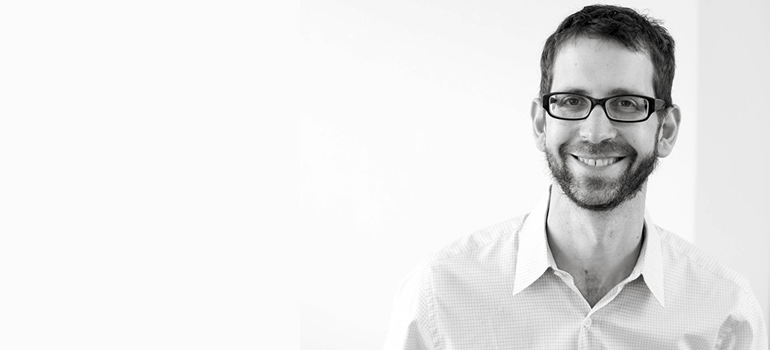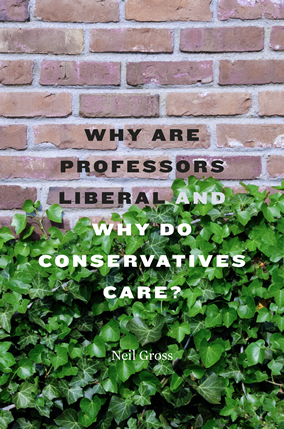
A Q and A with Prof. Neil Gross on universities and liberal thinking
Academia is one of the most liberal major occupations in the United States, says UBC professor of sociology Neil Gross. After nearly a decade of research, Gross has found that between 50 and 60 per cent of college and university professors hold liberal social and political views – meaning they are more likely to support abortion, gay marriage and gun control. His findings will be published in his new book Why Are Professors Liberal and Why Do Conservatives Care? later this month.
Gross traces American academia’s liberal history from the birth of research universities through the political upheavals of the 1960s and 1970s to explore the roots of academic liberalism and conservative response. Currently a visiting scholar at NYU’s Institute of Public Knowledge, he recently spoke with UBC’s Arts Faculty website ArtsWIRE about his research.

Neil Gross is a professor of sociology at UBC’s Vancouver campus. His book Why Are Professors Liberal and Why Do Conservatives Care? is published this month by Harvard University Press..
Q. What got you interested in the political leanings of academia as a research topic?
Gross: I first became interested in this topic when I was an assistant professor at Harvard and then-president Lawrence Summers made some controversial comments about women in math and science and innate ability. A large group of our faculty protested his comments. Outside the university, many said this was an example of the academic left jumping at the opportunity to reject a hypothesis simply because it didn’t square with their politics.
At the same time, prominent conservative activist David Horowitz was busy mounting a campaign for what he called the “Academic Bill of Rights,” which was designed to protect students against political indoctrination from faculty. I thought this was a fascinating set of issues and wanted to study them more.
Q. Did your research confirm that professors and academics tend to be liberal?
Gross: Broadly speaking, professors in the US and in most other parts of the world do tend to be on the political left. But the debate about whether this is a problem is more intense in the States. If you look at data from surveys, you’ll find that professors really do tend to hold social and political views that are to the left of other Americans—even if they’re not the radicals conservatives sometimes make them out to be. They also strongly prefer Democratic political candidates.
Q. Why do professors tend towards the political left?
Gross: There are many theories, but most turn out to be rather limited. One hypothesis is that higher education liberalizes us – not through indoctrination but as students improve their reasoning processes, their prejudices may fall away. On this account, professors tend to be liberals because they have spent so many years in higher education learning their trade.
Another hypothesis focuses on values. It holds that conservative students tend to be focused on making money, and says that therefore they’re not going to pursue academic careers at the same rate as their liberal counterparts. Another hypothesis looks at personality and cognitive ability. Perhaps, say some social scientists, liberals are more open to new experiences or just plain smarter than conservatives, which could account for their greater presence in an occupation relying on the production of new ideas.
Q. What is your own perspective on why academia is left-leaning?
Gross: I argue that professors are liberal because for historical reasons, the American professoriate has become what I call a “politically typed” occupation – one that is widely seen as suitable and appropriate for liberals but not suitable and appropriate for conservatives. This leads smart liberals to select into academic careers while conservative students select out of them.
It would be interesting to think about what the corporate world might look like if more people on the left pursued corporate careers.
Q. So can the notion that academics are liberals be considered a self-fulfilling prophecy?
Gross: In the book, I trace the roots of academia’s reputation for liberalism back to the Progressive Era between 1890 and the 1920s, when the first clashes between reform-minded social scientists and major philanthropists who were bankrolling research universities took place, “imprinting” academia in a liberal mold.
I also examine the development of opposition to the “liberal academic elite” in conservative thought. I argue that it was in the ‘50s that liberal professor bashing became really common among folks who were trying to develop and foster the growth of the conservative movement. This was important because it helped position conservatism as a populist enterprise by giving it an elite to rally against. And that still holds true in many ways today.
Q. Why does the political makeup of universities matter?
Gross: That’s a complicated question. One reason has to do with the legitimacy of the university as an institution. America is a politically divided nation and higher education institutions need bi-partisan support from politicians and voters if they are going to thrive, especially in a climate of resource scarcity.
Consider the argument that the liberalism of professors impacts the teaching enterprise in ways that are large and small, at least in the social sciences and humanities. Conservatives can claim that because the humanities and social sciences have been captured by the left, they don’t merit their support. And we’re seeing the effects. In a number of states, Republican governors have put higher education on the chopping block. Here, and at the federal level, we also see an attempt to scale back the research enterprise and to de-fund programs that are perceived to be particularly left-leaning.
Q. Does the corporate world care about the politics of colleges and universities?
Gross: Corporations rely on colleges and universities in many ways, not least as feeders for the workforce. At least some corporate elites have been supportive of efforts by conservative critics of the academy to try to change higher education, reasoning that the liberal tilt of the faculty means that students are being taught anti-business values. On the other side, it would be interesting to think about what the corporate world might look like if more people on the left pursued corporate careers.
Q. And what would academia look like if there were more right-leaning professors?
Gross: It would make some debates in the social sciences and humanities more lively. The only way it’s going to happen, though, would be if conservatives stopped denouncing the professoriate, began treating academic careers as a noble calling, and encouraged more right-leaning students to go to graduate school.
Q. With the baby-boomer generation approaching retirement, will we see a shift in attitudes as younger professors increasingly step into teaching and research positions?
Gross: My research suggests that professors approaching retirement age now are more likely to consider themselves “radical” than younger professors whose political views were formed in the 80s and 90s, which were not decades of intense social movement activity on college and university campuses. However, my data stop in 2006 and it will be interesting to see to what extent the newest generation of professors will be caught up in the Occupy Wall Street movement.
Q. Do Canadian academics also tend to be more liberal than Canadians working in other sectors?
Gross: My research doesn’t look into this issue but there are certainly plenty of folks on the Canadian right who think that higher education is a bastion of liberalism.
Q. To what extent did your own political leanings motivate your choice of career?
Gross: I didn’t go into sociology for political reasons. But I think a career in academics would not have been as much of a live possibility for me had I come from a conservative family. It just wouldn’t have been on my radar screen in the same way.
Neil Gross is a professor of sociology at UBC’s Vancouver campus. He is the editor of Sociological Theory, a quarterly journal of the American Sociological Association. His book Why Are Professors Liberal and Why Do Conservatives Care? is published this month by Harvard University Press.